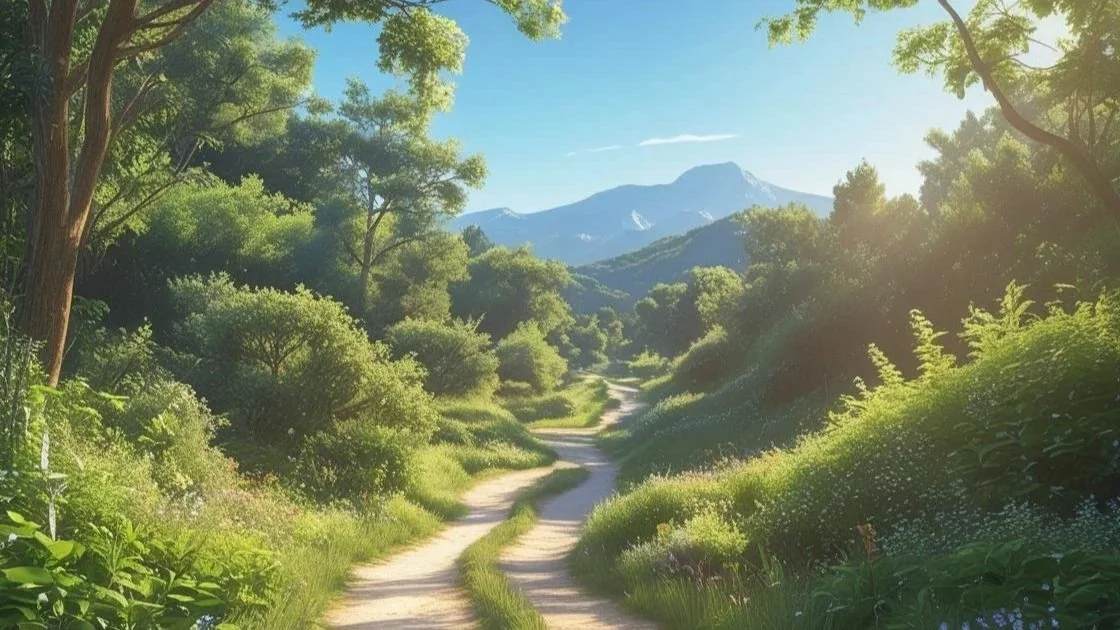How Comparing Your Life to Others Can Leave You Feeling Left Behind
“Always be a first-rate version of yourself, instead of a second-rate version of somebody else.”
The feeling creeps in quietly, often when you least expect it. You're scrolling through social media, chatting with a friend, or simply observing the people around you, and suddenly there it is: that familiar pang of not quite good enough. Everyone else seems to have it figured out.
Everyone else is way ahead of you.
And this hits harder when you reach your fifties and beyond. Now there's additional weight: the nagging voice that whispers it's too late to change course, too late to catch up, too late to create the life you once imagined.
I was reminded of this recently when I was out with a group of people I have known for years, all roughly in my age range. Compared to them I was certainly behind. They were mostly retired, me still working. They had the time and resources to travel or do nothing at all. But I'm still playing catch up after my divorce and redundancy a decade ago. And yes you can find yourself resenting!
But the truth is that this comparison game is rigged from the start. The playing field was never even to begin with.
The Uneven Playing Field
We all know that not all of us are born equal.
Some arrive with privileges that put them several pegs ahead: family money, connections and safety nets. So how can there ever be any real comparison between those with huge safety nets and those who never had any?
It's like beating yourself up for losing a race when you know the other competitors were given a mile head start. It was never a fair race, was it?
But my take on this is simple.
Privilege comes with its downside because those with it miss out. Being born with a safety net means you never really know what it's like to fully stand on your own two feet. How can you? It's like the difference between walking a high tightrope and looking down to see a safety net below you versus looking down at the hard floor and knowing you better get this right because there is nothing to catch you. It's all down to you.
And as much as we dislike our hardships there is something wonderful about them too. The opportunity that comes with them.
You see when you've learned to pick yourself up over and over without the help of mummy, daddy or whoever, you become almost superhuman. As you age there's a solid belief in yourself that nothing can unsettle for long.
So maybe it's worth asking ourselves:
What drives us to compare in the first place, and how can we break free from that habit?
Why Comparison Hurts More as We Age
Comparison is human nature. Our brains evolved to assess our position relative to others for survival. But in later decades, it takes on a crueller edge. We're not just comparing present circumstances; we're measuring our entire life's trajectory against others.
We look at peers who seem to have accumulated more wealth, maintained better health, or achieved greater recognition, and feel the weight of perceived missed opportunities. The timeline feels finite in a way it didn't when we were younger, making every comparison feel urgent and final.
Society reinforces this poison with the narrative that our most productive years are behind us. We're told that dreams have expiration dates, that reinvention is a young person's game, that settling is mature. This makes comparison toxic. It suggests that if we haven't 'made it' by now, we never will.
Meanwhile, we're comparing our behind-the-scenes reality to everyone else's highlight reel. We see holiday photos but not credit card debt. We notice promotion announcements but miss the sleepless nights and anxiety. We admire perfect relationships in anniversary posts, unaware of the arguments and compromises happening behind closed doors.
The Hidden Truth About "Success"
Here's what I've learnt: even those who seem to have perfect lives rarely are what they appear.
Success often comes with invisible costs: strained relationships, health issues, moral compromises, or simply the exhaustion of maintaining appearances.
More importantly, many advantages stem from circumstances beyond anyone's control: family money, connections, geography, timing, health. This doesn't diminish achievements, but it provides crucial context missing from our comparisons.
When I see someone who appears to "have it all," I remember I'm seeing only a snapshot. I don't know their struggles, sacrifices, or private battles. And their path may not align with my values anyway.
How to Break Free from Comparing Yourself to Others
Define Success for Yourself
Get crystal clear about what success means to you: not to your parents, culture, or society. What does fulfilment look like through your own lens?
For me, success includes peace of mind, personal autonomy, meaningful relationships, and knowing I can handle whatever life throws at me. Your definition will be different, and that's exactly the point.
Celebrate Your Unique Journey
Every challenge has shaped who you are today. The setbacks, struggles, moments when you had to rely entirely on yourself: these gave you strength, resilience, and wisdom that can't be purchased or inherited.
I'm grateful for the self-reliance I've developed, even through difficult circumstances. It taught me I'm more capable than I imagined, and that knowledge is invaluable.
Curate Your Information Diet
Be intentional about what you consume. If certain social media accounts, conversations, or news sources consistently trigger comparison and inadequacy, limit your exposure. This isn't denial: it's protecting your mental space to focus on what matters.
Remember: Timing Varies (Especially Later in Life)
Life isn't a race with a universal timeline. This becomes increasingly important with age. Some find love early, others later. Some discover their calling in their twenties, others in their seventies.
The narrative that our transformative years are behind us after a certain age is false. Laura Ingalls Wilder published her first Little House book at 65. Grandma Moses began painting at 78. Colonel Sanders founded KFC at 65. Julia Child wrote her first cookbook at 50.
Your story isn't over. This chapter might be setting up your most fulfilling period yet.
Focus on Growth, Not Position
Instead of asking "How do I measure up?" ask "How am I growing?" Track progress against your past self, not others. Are you more confident than five years ago? More skilled? More aligned with your values? These metrics matter far more than external comparisons.
The Gift of Self-Reliance
Complete self-reliance, whilst challenging, is profoundly empowering, and this power deepens with age. When you know you can handle whatever comes, deep confidence emerges. You stop needing external validation because you've proved to yourself that you're enough.
At this stage of life, self-reliance takes on greater significance. You've weathered storms, survived losses, adapted to unimaginable changes. You've learnt you're more resilient than you thought. This isn't a consolation prize: it's wisdom younger people cannot possess.
This doesn't mean isolation. It means knowing your worth isn't dependent on safety nets or meeting others' definitions of success. It means trusting yourself to navigate whatever comes next, especially when others suggest your best years are behind you.
Your Story Matters (And Continues)
If you're feeling unsuccessful compared to friends or neighbours, maybe you need to readjust your view.
Those beautiful showcased lives aren't always what they appear.
More importantly, their story isn't yours, and your story is far from finished.
If you're in later decades feeling like you've missed the boat, consider this:
You have something younger people don't: perspective, experience, and freedom from caring about others' opinions.
You've survived everything so far. You've accumulated wisdom that can't be taught or bought.
Your journey, with all its detours, setbacks, and unique challenges, has value that can't be measured against anyone else's path. The strength you've developed, lessons learnt, character built through navigating difficulties: these are achievements worth celebrating, regardless of age.
The goal isn't to stop noticing others' successes or become indifferent to growth. It's to develop such strong self-worth that others' paths become interesting rather than threatening, inspiring rather than intimidating. This self-assurance often grows stronger, not weaker, with age.
You are not behind.
You are not too late.
You are exactly where you need to be, learning exactly what you need to learn, becoming exactly who you're meant to become.
And that truth has no expiration date.


